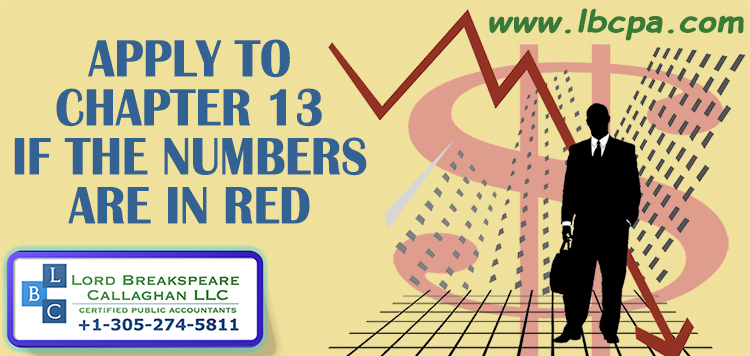LBCPA News 
Click here to go back
APPLY TO CHAPTER 13 IF THE NUMBERS ARE IN RED

Bankruptcy is a last resort for taxpayers to get out of debts. For individuals, the most common type of bankruptcy is a Chapter 13. This section of the bankruptcy law allows individuals and small business owners in financial difficulty to repay their creditors. Chapter 13 bankruptcy is only available to wage earners, the self-employed and sole proprietor businesses.
Tax obligations while filing Chapter 13 bankruptcy:
- Taxpayers must file all required tax returns for tax periods ending within four years of their bankruptcy filing.
- During a bankruptcy taxpayers must continue to file, or get an extension of time to file, all required returns.
- During a bankruptcy case taxpayers should pay all current taxes as they come due.
- Failure to file returns and pay current taxes during a bankruptcy may result in a case being dismissed, converted to a liquidating bankruptcy Chapter 7, or the Chapter 13 plan may not be confirmed.
Other things to know:
- If the IRS is listed as a creditor in their bankruptcy, the IRS will receive electronic notice about their case from the U.S. Bankruptcy Courts. People can check by calling the IRS' Centralized Insolvency Operation at 800-973-0424 and giving them the bankruptcy case number.
- If one of the reasons a taxpayer is filing bankruptcy is overdue federal tax debts, they may need to increase their withholding or their estimated tax payments. The Tax Withholding Estimator can help people determine the proper withholding. The IRS.gov Estimated Taxes page has more information on estimated taxes.
- People can receive tax refunds while in bankruptcy. However, refunds may be subject to delay or used to pay down their tax debts. Taxpayers can see if their refund has been delayed or offset against their tax debts by going to the Where's My Refund? tool or by contacting the Centralized Insolvency Operations Unit.
Other types of bankruptcy
Partnerships and corporations file bankruptcy under Chapter 7, Liquidation or Chapter 11, Reorganization of the bankruptcy code. Individuals may also file under Chapter 7 or Chapter 11. Other types of bankruptcy include Chapters 9, 12 and 15. Cases under these chapters of the bankruptcy code involve municipalities, family farmers and fisherman, and international cases.
If you have any questions regarding accounting, domestic taxation, essential business accounting, international taxation, IRS representation, U.S. tax implications of Real Estate transactions or financial statements, please give us a call at 305-274-5811.
Source: IRS






